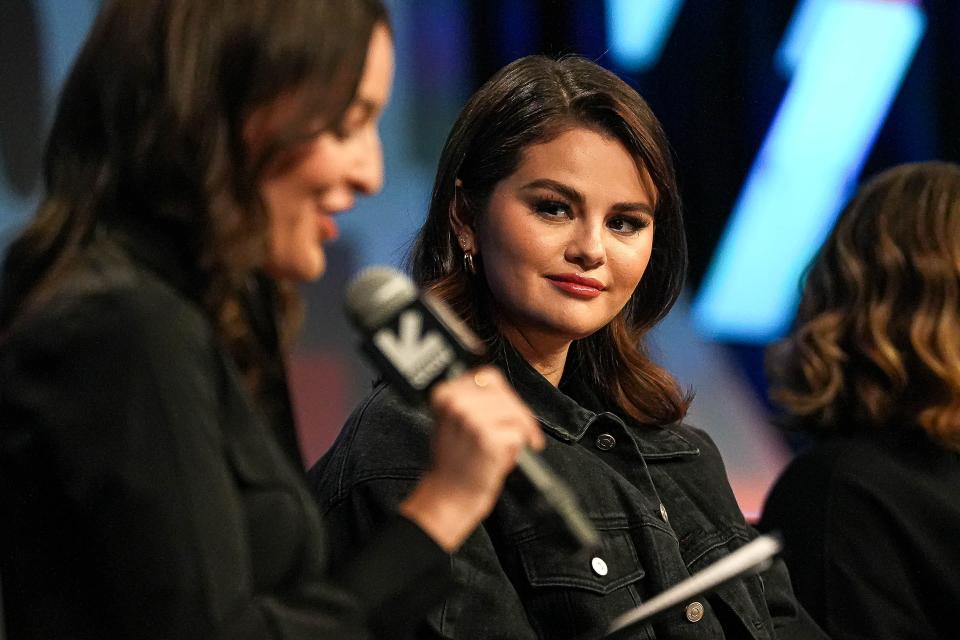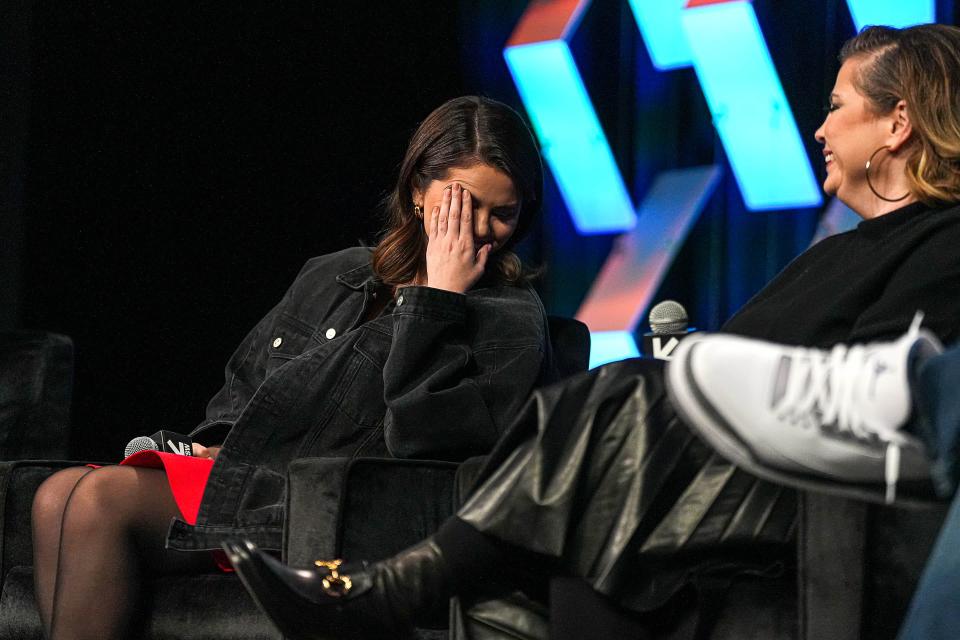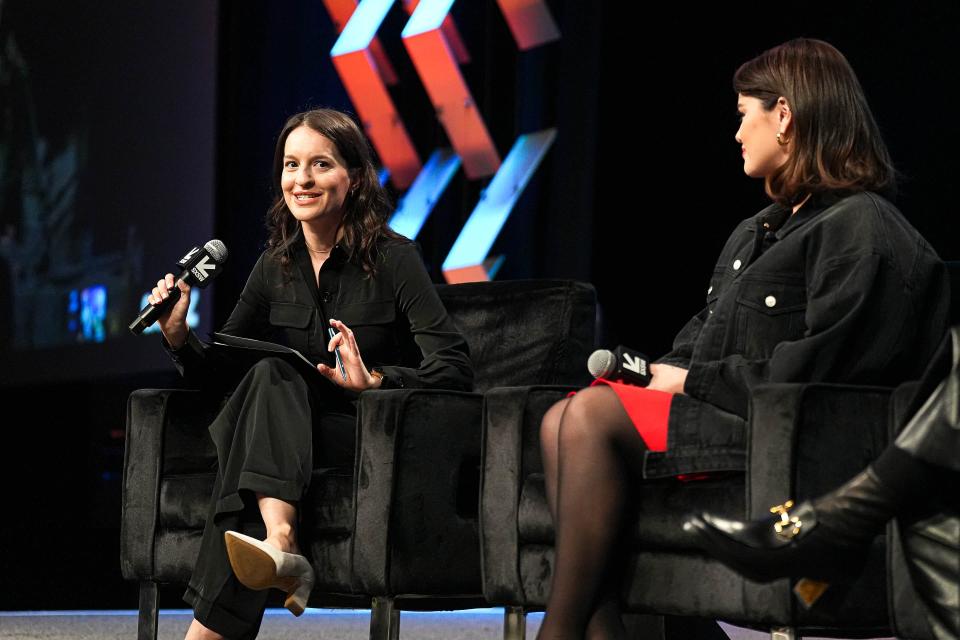'I am in a better place now': Selena Gomez talks mental health at SXSW
- Oops!Something went wrong.Please try again later.
Editor's note: This story includes references to suicide. Information about suicide warning signs and resources for people in crisis can be found at the bottom of this story.
"Hi," Selena Gomez said to the full crowd at South by Southwest on Sunday afternoon after sitting down. Then she introduced herself: "I'm Selena."
The pop star and "Only Murders in the Building" actress shared her mental health story along with her mother, Mandy Teefey; New York Jets defensive lineman Solomon Thomas; and therapists Corey Yeager and Jessica Stern. Gomez and Teefey co-founded Wondermind, a community-based mental health website and soon-to-be app, and Thomas and his family started the Defensive Line, a nonprofit helping youths of color with mental health and suicide prevention.
With the release of her 2022 documentary "My Mind and Me," Gomez has been public about her bipolar diagnosis and the mental health crisis that led her to cancel her 2016 tour.
"I was terrified to do it," she said. "The moment I did it, there was just an insane release. ... It has helped relieve the anxiety of trying to keep it in."

The feedback of fans, and others who have gone through something similar, has reassured her that talking about her mental health is the right thing to do.
We have to talk about mental health
Celebrities such as Gomez and Thomas sharing their stories does help, Yeager said. If all we see on Instagram is "Selena doing great work, Solomon doing great work, we don't see the grind," he said.
For Thomas, "to be honest about my mental health took time to get here," he said. He grew up in locker rooms where being vulnerable, being emotional, wasn't safe. He lost his sister Ella to suicide.
"I was hit by grief," he said. "I couldn't go to sleep. I couldn't wake up." He was having suicidal ideations. "I had to do the work," he said. "I learned it's OK to not be OK."
Now he openly talks in the locker room, in public, about feeling emotions, about mental health.
"This world needs more people speaking up," Thomas said.
He nodded to the anxiety of speaking at SXSW by saying: "Hey, I am a little anxious. I've got this speaking event coming up. There are 17,000 people in here."

How we talk to ourselves
Teefey talked about growing up always feeling different because of her mental health. She told herself, "Oh, I must be crazy." Then about her attention-deficit/hyperactivity disorder: "I am stupid."
"It became my truth," she said.
She now lives by the rule "If I wouldn't say that to my best friend, I am not allowed to say that to myself."
Yeager confirmed that it is easier to live with negative patterns of bad self-talk. Positive thinking requires work.
"I will give grace to someone, but I won't give grace to myself," he said.
For Thomas, the first 16 years of his 18-year NFL career, he "talked to myself terribly."
Now you will see him on the sidelines talking to himself: "I will. I can. I am confident." He no longer tells himself that he is not good enough. "That destroyed my confidence," he said.
Gomez said that lack of confidence was real. "I work in the weirdest industry," she said. "I felt like I didn't fit in."

The documentary allowed Gomez to relive how she talked about herself during the six years the film covers.
"It makes me sick to hear the things I said to myself. It bums me out," she said.
She was saying things she would never say to herself now, after going to a treatment center and engaging in regular therapy, including dialectical behavior therapy, which uses tools such as checking the facts of your thoughts to get out of the spin of them in your head.
"All the things I was bitching about then, I am grateful for now," she said.
Putting yourself first is good mental health
Teefey, who was a producer of the series "13 Reasons Why" along with her daughter, had her own mental health crisis during the second season of that show.
"I was crumbling," she said. "I spent all these years investing my energy giving to others."
She was having seizures and was crying every day. She went to a treatment center for the first time.
"I had to sit with who I was," she said of treatment. "It was lovely because I had no cellphone. You have to focus on yourself."
For Gomez, many people in her life wanted her to seek treatment before she finally went.
"I wasn't ready for it," she said. "It took me a couple of tries, but I think I am in a better place now."

What is now in their mental health toolbox?
For Gomez, it's therapy and meetings. She especially likes the dialectical behavior therapy technique of RAIN:
Recognize what is going on.
Allow the experience to be there, just as it is.
Investigate with kindness.
Natural awareness, which comes from not identifying with the experience.
Teefey loves taking a class to learn more as well as writing in a journal.
"It soothes me. It gives me a sense of control. It helps me find peace," she said.
Yeager employs what he calls a supreme court of three to five people who know him well. He can call them and get their opinion and relieve the pressure.
Thomas uses meditation to ground himself.
"I'm a big overthinker," he said. He also journals and said, "Therapy saved my life. You get to know yourself more."
He's an advocate for simple self-care, such as going out in the sun, getting 20 minutes of exercise, being off your phone and drinking enough water.
"It can be simple things," he said.
If you or someone you know is suffering with mental health or suicidal thoughts, call the Suicide & Crisis Lifeline at 988 or text the 24-hour Integral Care line at 741-741.
This article originally appeared on Austin American-Statesman: Selena Gomez, Mandy Teefey, Solomon Thomas talk mental health at SXSW

